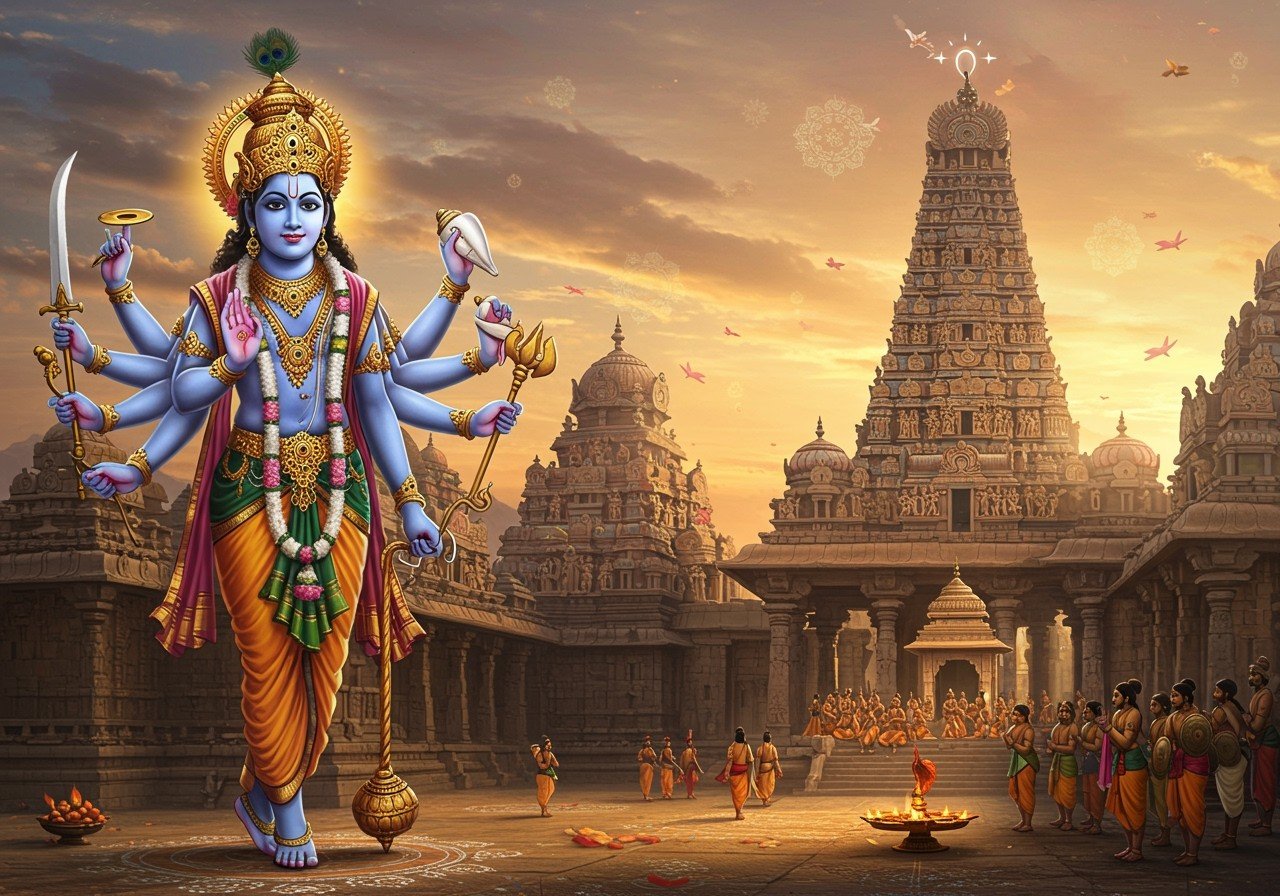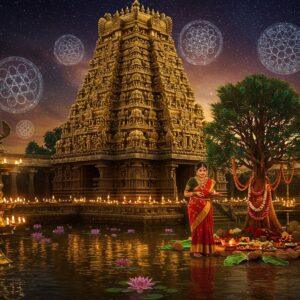
Nestled in the heart of Kanchipuram, Tamil Nadu, lies the enchanting Pandava Thoothar Perumal Temple, a testament to India’s rich spiritual and cultural heritage. This sacred sanctuary holds a revered place in Hindu mythology, deeply intertwined with the epic Mahabharata. Journey back to the Dwapara Yuga, where Lord Krishna, embodying divine wisdom, acted as the “thoothar,” or messenger, to the Pandavas. The temple beautifully marries architectural grandeur with profound spiritual significance, beckoning devotees and curious travelers alike to explore its sacred depths.
A Glimpse into History: The Story of the Messenger
The Pandava Thoothar Perumal Temple’s historical significance is rooted in the Mahabharata. It commemorates Lord Krishna’s pivotal diplomatic role during this epic period. The temple stands as a timeless tribute to Krishna’s efforts as a messenger, facilitating communication and understanding amidst the complexities of the Pandava’s struggles. The temple’s architecture showcases the exquisite Dravidian style, a hallmark of South Indian temples, boasting intricate carvings and majestic gopurams that inspire awe and reverence.
As an integral part of the Vaishnavism tradition, a major branch of Hinduism dedicated to Lord Vishnu, this temple resonates with deep religious meaning. Ancient rituals and vibrant festivals, observed for centuries, continue to be practiced with unwavering devotion, offering a captivating window into the spiritual heart of the region.
Architectural Marvel: Where Divinity Meets Design
The Pandava Thoothar Perumal Temple is an architectural masterpiece, showcasing the intricate beauty of Dravidian artistry. The garbhagriha, the sanctum sanctorum, houses the deity of Krishna as Pandava Thoothar, the divine messenger. This sacred space forms the heart of the temple, drawing devotees to offer their heartfelt prayers.
The temple’s exquisite sculptures and detailed relief work narrate captivating stories from Hindu scriptures, bringing divine tales to life. The mandapams, or pillared halls, evoke a sense of wonder, serving as venues for religious gatherings and cultural performances, enriching the temple’s vibrant atmosphere. Traditionally, devotees circumambulate the temple along the prakaram, seeking blessings and spiritual solace. The vimana, the towering structure above the sanctum, symbolizes the cosmic axis, connecting the earthly realm with the divine.
Planning Your Visit: Timings and Sacred Rituals
The temple welcomes visitors during specific hours. In 2025, the temple is open from 7:00 AM to 11:00 AM and 4:00 PM to 7:30 PM. Throughout the day, priests conduct sacred rituals and poojas with utmost devotion, including the mesmerizing morning and evening aarti, a captivating offering of light.
Festivals, especially Krishna Janmashtami, transform the temple into a hub of vibrant celebration. Pilgrims gather from far and wide to participate in special ceremonies and experience the divine energy. Maintaining respectful etiquette and adhering to the dress code is essential during your visit, ensuring a harmonious experience for all. Consider enhancing your spiritual experience with traditional attire available at Poojn.in.
Finding Your Way: Reaching the Sacred Grounds
Reaching the Pandava Thoothar Perumal Temple is convenient, with various transportation options available. Chennai, the nearest major city, lies approximately 60 km away and is well-connected by bus, train, and taxi services. Regular bus routes to Kanchipuram make it easily accessible for visitors.
The Kanchipuram railway station offers proximity to the temple. If direct trains are unavailable, you can travel to Chennai and continue your journey by road. The Old Kanchipuram Railway Station is just a short, 21-minute walk from the temple. For those arriving by air, Chennai International Airport is the closest option, with convenient onward transportation to Kanchipuram readily available.
Accommodation: Rest and Rejuvenate
A range of accommodation options caters to diverse preferences, from budget-friendly lodges to luxurious hotels, all conveniently located near the temple. Many establishments offer amenities such as complimentary breakfast and Wi-Fi, ensuring a comfortable stay.
During peak seasons and festivals, accommodation tends to fill up quickly. Exploring alternative options or booking in advance is recommended to ensure a pleasant and stress-free stay. Staying in Kanchipuram provides an opportunity to immerse yourself in the local culture and explore the town’s rich heritage beyond the temple visit.
Experiencing Kanchipuram: Culture and Traditions
Immerse yourself in the rich cultural tapestry of Kanchipuram, renowned for its exquisite handwoven silk sarees. Engage with local artisans and witness the intricate craftsmanship of silk weaving firsthand. Partake in the vibrant local festivals, each steeped in deep cultural and spiritual meaning. Respecting local customs enhances your visit, enriching your understanding of this sacred region’s heritage.
Explore nearby temples and historical sites to delve deeper into Kanchipuram’s fascinating history and cultural legacy. A visit to this town is an opportunity to discover and appreciate the vibrant traditions that define this sacred land.
Essential Pooja Items for a Blessed Visit
Planning a visit to the sacred Pandava Thoothar Perumal Temple? Prepare for a truly meaningful experience by bringing traditional pooja items. Poojn.in, India’s largest Dashakarma bhandar, offers a convenient way to acquire everything you need:
- Fresh coconuts and beetle leaves: Symbolic offerings of purity and respect.
- Pure cotton vastram (clothing): A gesture of adorning the deity.
- Traditional oil lamps (vilakku) and ghee: Illuminating the divine presence.
- Camphor and incense sticks: Creating a sacred atmosphere with fragrant offerings.
- Pure kumkum and chandanam: Traditional markings signifying auspiciousness.
- Flower garlands and loose flowers: Expressing devotion through vibrant blooms.
- Prasadam items like fruits and sweets: Sharing blessed food as a symbol of community and gratitude.
You can find a complete Dashakarma kit and other essential items here.
Poojn.in offers:
- 100% pure and authentic items: Ensuring the highest quality for your spiritual practices.
- Carefully packaged products: Maintaining the sanctity and integrity of your items.
- Doorstep delivery across India: Bringing convenience to your doorstep.
- Easy online ordering process: Simplifying your purchase with a seamless experience.
Need assistance? Reach out to us:
- Phone: 03369029784
- WhatsApp: 9476142738
- Website: www.poojn.in
All items are available at competitive prices with secure payment options. For timely delivery, please order at least 3-4 days before your planned temple visit.
Conclusion: A Journey of Blessings
The Pandava Thoothar Perumal Temple transcends being merely a place of worship; it embodies history, culture, and deep spirituality. Visiting this sacred site offers a unique glimpse into the splendor of Dravidian architecture and the enduring traditions that make it truly exceptional. The serene atmosphere invites contemplation, fostering a connection with the divine.
As you plan your visit, embrace the local culture and traditions. Engage with the community, explore the vibrant town of Kanchipuram, and allow the experience to enrich your spiritual journey. Whether you seek divine blessings or a deeper understanding of cultural heritage, the temple extends a warm welcome.
May your visit to the Pandava Thoothar Perumal Temple be an unforgettable experience, filled with peace, blessings, and spiritual enlightenment.
Frequently Asked Questions
What are the timings for the Pandava Thoothar Perumal Temple in 2025? The temple is open from 7:00 AM to 11:00 AM and from 4:00 PM to 7:30 PM. These timings provide ample opportunity to experience the temple’s serene atmosphere, whether you prefer the quiet of the morning or the peaceful glow of the evening.
Could you share some insights into the temple’s history? This ancient temple is steeped in history, tracing its roots back to the Mahabharata period. It is dedicated to Lord Krishna in his role as the divine messenger, or “thoothar,” to the Pandavas. The temple stands as a living testament to this significant era, preserving ancient stories and traditions.
What’s the best way to reach the temple? The temple is easily accessible. You can reach Kanchipuram by bus or train from major cities. From Kanchipuram, local transport or taxis can take you directly to the temple. You can also choose to walk from the Old Kanchipuram Railway Station, which is approximately a 21-minute journey.
Are there accommodation options near the temple? Yes, a variety of accommodations are available near the temple, ranging from budget-friendly options to more comfortable hotels. It is recommended to book in advance, especially during festival seasons, to ensure a hassle-free stay. You can also find suitable lodgings near other temples for a broader cultural experience.
Is there parking available near the temple? Yes, parking facilities are available near the temple. However, during weekends and festivals, parking can become limited due to the increased number of visitors. Arriving early is recommended to secure a parking spot comfortably.
What is the appropriate attire for visiting the temple? Traditional attire is encouraged when visiting the temple. Men typically wear dhotis, and women often wear sarees or salwar kameez. This dress code reflects respect for the temple’s sanctity and the traditions associated with it. Find authentic and beautiful holy clothing at Poojn.in to enhance your temple visit.
What special rituals are performed at the temple? The temple hosts various special rituals and ceremonies throughout the year, including the grand annual Brahmotsavam. Participating in these rituals can deepen your connection with the temple’s spiritual significance and offer a richer cultural experience.
Can I take photographs inside the temple? Photography restrictions may apply within the temple premises. It’s essential to respect the temple’s rules and regulations. It is always advisable to inquire with temple authorities or staff for clarification on photography guidelines before taking pictures.


